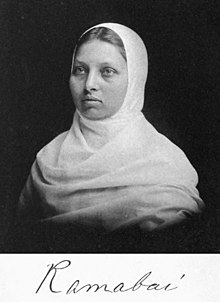Pandita Ramabai
| Pandita Ramabai | |
|---|---|

Pandita Ramabai Sarasvati
|
|
| Born | 23 April 1858 Canara district, Madras Presidency, British India |
| Died |
5 April 1922 (aged 63) Bombay Presidency, British India |
| Venerated in | Episcopal Church (United States), Episcopal Anglican Church of Brazil |
| Feast | 5 April |
Pandita Ramabai (23 April 1858 – 5 April 1922) was an Indian social reformer, a champion for the emancipation of women, and a pioneer in education. She acquired a reputation as a Sanskrit scholar.Template:Criticism sidebarPandita Ramabai was a social worker, scholar and a champion of women’s’ rights, freedom and education. ‘Pandita’ was the title bestowed on her excellent command over Sanskrit at a very young age. Pandita Ramabai participated in the freedom movement and was one of the 10 women delegates of the Congress session of 1889.
Ramabai was born on 23rd April, 1858. She was the daughter of the Sanskrit scholar Anant Shastri Dongre, and his second wife Lakshmibai Dongre. Anant Shastri Dongre taught both his second wife and his daughter the Sanskrit texts, even though the learning of Sanskrit and formal education was forbidden for women and lower castes people.
Sanskrit Scholarship
When her parents died in the 1877 famine, Ramabai and her brother decided to continue their father's work. She and her brother travelled all over India. Ramabai's fame as a lecturer reached Calcutta, where the pandits invited her to speak. In 1878, Calcutta University, conferred on her the title of Pandita, as well as the highest title of Saraswati in recognition of her interpretations of various Sanskrit works. The theistic reformer Keshab Chandra Sen gave her a copy of the Vedas, the most sacred of all Hindu literature, and encouraged her to read them.
After the death of her brother in 1880, Ramabai married Bengali lawyer, Bipin Behari Medhvi and they had a daughter whom they named Manorama. Medhvi was a Bengali Kayastha, and so her marriage was inter-caste, and therefore considered inappropriate for that age. They were married in a civil ceremony on 13 November 1880. Ramabai resolved to spend her life attempting to better the status of women in India. She studied and discussed issues which surround Indian women, especially Hindu traditions. She spoke against the practice of child marriage and the resulting constraints on the lives of child widows. Husband and wife had planned to start a school for child widows, when Medhvi died in 1882.
After Medhvi's death, Ramabai moved to Pune where she founded Arya Mahila Samaj, which is Sanskrit for "Noble Women's Society." The purpose of the society was to promote the cause of women's education and deliverance from the oppression of child marriage. When in 1882 a commission was appointed by Government of India to look into education, Ramabai gave evidence before it. In an address to Lord Ripon's Education Commission, she declared with fervor, "In ninety-nine cases out of a hundred the educated men of this country are opposed to female education and the proper position of women. If they observe the slightest fault, they magnify the grain of mustard-seed into a mountain, and try to ruin the character of a woman." She suggested that teachers be trained and women school inspectors be appointed. Further, she said that as the situation in India was that women's conditions were such that women could only medically treat them, Indian women should be admitted to medical colleges. Ramabai's evidence created a great sensation and reached Queen Victoria. It bore fruit later in starting of the Women's Medical Movement by Lady Dufferin.
...
Wikipedia
